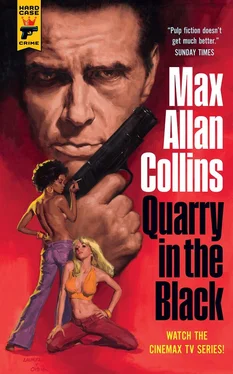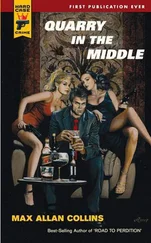She frowned in confusion. “I will?”
“Yes, I’m going to be a house guest of yours, at least this evening. Because of these violent events, I’ve been added to your husband’s security staff.”
“That’s an excellent idea, Jack, but I won’t be there tonight. Because of this violence.”
“Oh?”
She nodded. “Raymond is concerned for me. I’m staying with my sister tonight, away from the house. And...” She added this with a twinkle. “...apparently away from temptation , since you’ll be there.”
She pinched my cheek and went off down the sidewalk, smiling.
My good deed for the day. Perhaps I shouldn’t admit it, but this encounter was making me question the Reverend’s sanity. That was a woman any man could love, in all the word’s meanings.
I stepped back inside HQ and Ruth was right there, looking worried, even alarmed. “What was that about?”
“Oh, Mrs. Lloyd wondered if I was available for dating. I hated to disappoint, but I told her no. That you and I were going steady.”
She smiled big at that, but didn’t pinch my cheek. She did slap me on the chest, not gently, and say, “Oh you .”
Still, I was charming them left and right, wasn’t I?
I told Ruth about my addition to the Reverend’s bodyguard contingent and she was glad to hear it, but advised me to be careful.
She frowned. “You heard about that neo-Nazi in Ferguson? And poor André, right in our backyard?”
Back alley, actually, but I nodded.
She shook her head glumly. “When did America get so violent?”
“Right around the time,” I said, “my ancestors were throwing your ancestors into chains in the bottom of ships.”
Her eyebrows went up. “Good point. But do be careful. It’s getting crazy out there.”
“I noticed.”
Then one of the cops wanted to talk to me. The interview took three minutes. He was really impressed by my Bronze Star.
The Reverend lived in the Ville, a residential and business district just northwest of downtown. According to Ruth, it was for many decades an African-American cultural center, dating back to when the neighborhood was one of a handful where blacks could own houses and business properties, or even rent them.
“In that small area, of less than a square mile,” she told me at Coalition HQ, “there were black businesses, schools, community groups, a hospital... stayed that way till maybe ten years ago.”
“No kidding,” I said.
I must not have seemed suitably impressed, because she added, “Chuck Berry and Tina Turner grew up there.”
“Together?” I asked, and got another “Oh, you!” look out of her. Truth was, that was impressive.
But driving my Impala through this black neighborhood in the early evening, I wasn’t impressed. At least not favorably. The Ville was pretty rough now. Buildings were tumbledown with windows boarded over, and junkies prowled the streets like rats looking for garbage cans.
The two-story white-trimmed red-brick house, however, was on a block where the homes were generally well-maintained. Sitting on a modest lot, the Lloyd residence had an open porch with a swing and a row of three windows above the overhang. A matching freestanding garage waited at the end of a cement drive. Out front the familiar black Grand Prix was parked.
Ruth said that the Reverend could afford to move out of the neighborhood, but he wanted to show solidarity with other residents of the Ville.
I pulled the Impala in behind the Grand Prix and got out and was soon up the brick steps and at the front door. The nine millimeter, which I’d been requested to bring, was in my waistband, under a new navy windbreaker; my light-blue sportshirt, jeans and sneakers were new as well. Nothing like getting drenched in blood to prompt freshening up your wardrobe.
The big black guy who answered the door was familiar to me from Coalition HQ. This imposing figure was Terrell, who with his associate, Deon, did more than just help chauffeur and bodyguard the Reverend — they also played cards and listened to soul music in the back room. Good gig.
Terrell had a head the size of a gallon paint can, only more rounded, with hair cut close to the scalp; he sported a Rosie Greer goatee. He wore the standard black undertaker suit with a dark blue tie, his expression narrow-eyed and glowering, but that was misleading. Really he was a pussycat. A pussycat with a .45 automatic under his arm.
“Jackie boy,” he said in a friendly growl, the corners of the wide mouth turning up slightly. “I hear you gonna run interference for brother Deon and me, that it?”
“More like quarterback,” I said.
He smirked and let me in. “Careful you don’t get rushed.”
The vestibule opened onto an area with a hardwood floor shared by a staircase and a hallway back to the kitchen. Open doors were on my either side, study and dining room, plaster walls a pale green, woodwork handsome and dark. This house had been built a long time ago, early in this century, by fine craftsmen for somebody with dough.
Terrell abandoned me to go into the dining room, where his “brother” Deon was waiting. I didn’t know whether Deon was really his brother or just a brother in the other sense.
In the medium-sized study, the Reverend — in rolled-up shirtsleeves and black-framed glasses — sat at an ancient walnut desk with a dark leather top, writing in longhand on bond paper. Wadded-up balls of the stuff surrounded a wastebasket nearby. Built-in floor-to-ceiling shelves bore books, not fancy leather-bound stuff for show, but hardcovers and paperbacks of assorted vintage with a worn look, somewhat haphazardly stacked. A working office. He did not acknowledge my presence. That was nothing new — the best I’d ever got from him at HQ was a nod.
The somewhat formal dining room, with china cabinet and sideboard, was set up for Terrell and Deon, who were not sleep-in help — like me, they were here for security concerns born out of André’s passing. Him, and the dead Nazi who turned up in a church parking lot.
That I got rid of both those pricks would have come as quite a shock to Terrell and Deon, and the Reverend, too. But not as big a one as the noise suppressor tucked down in my left windbreaker pocket.
Is that a silencer or are you just glad to see me?
The two massive men were playing gin rummy at one end of the long dining-room table; Deon, a little bigger than Terrell, modest Afro, no beard, was keeping score. Mid-table like a centerpiece, sat a small portable TV with rabbit ears with an extension cord trailing off; right now Laugh-In was on, Arte Johnson in a German army helmet saying, “Very interesting... but stupid.”
Without looking at me, Deon asked, “You eat?”
“Now and then.”
“Smart-ass white boy,” Deon said, but he was smiling. Also a pussycat. Also packing a .45, which was obvious because his black suitcoat was hung over the back of his chair, the shoulder-holstered weapon out in the open.
Terrell said, “Colonel Sanders in the kitchen.”
“No shit?” I said. “This I got to see.”
As I went back to the kitchen, I heard Deon say, “Smart-ass white boy” again.
About a third of the Kentucky Fried Chicken bucket was gone, but I found a breast. Original recipe, which is my preference. I held it with a napkin, having been raised well, and checked the refrigerator for something to drink — fucking Budweiser again and, damn it, Pepsi. Some days you can’t win. I took a can of the pop anyway.
I went back to the dining room, standing just inside the open double-doorway, nibbling my chicken, occasionally sipping the Pepsi.
I said, “Don’t you fellas know eating chicken is a racist stereotype?”
Читать дальше











